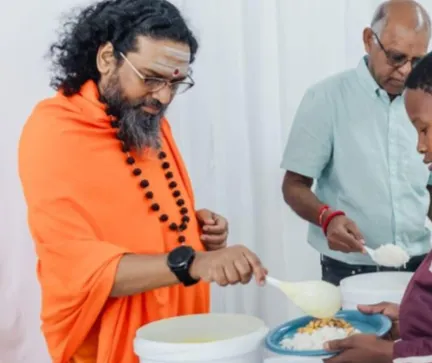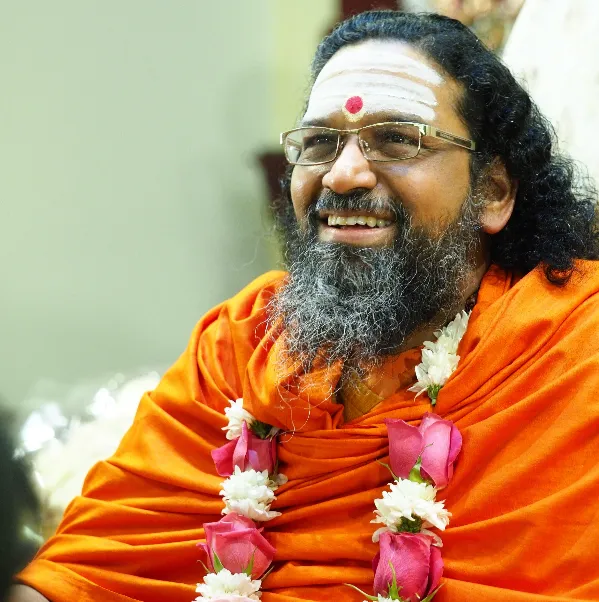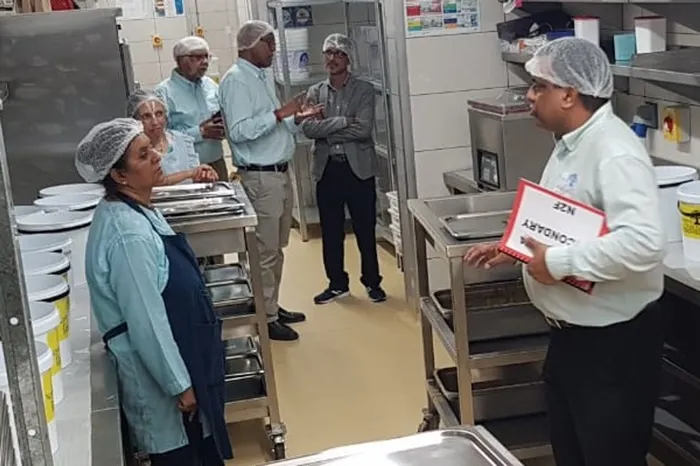200,000 meals of hope: Nourish to Flourish's remarkable first year
Serving Meals and Restoring Dignity

Swami Abhedananda, spiritual head Chinmaya Mission South Africa, as part of the Nourish to Flourish project
Image: Supplied
In just one year, Chinmaya Mission South Africa's Nourish to Flourish initiative has served over 200,000 meals to vulnerable communities across Chatsworth. What began as a small feeding programme has transformed into a daily operation serving 1,700 meals through schools, social welfare organisations, and disaster relief efforts - embodying Diwali's message of light overcoming darkness, writes RAKESH RAMDHIN.

Swami Abhedananda This Diwali, as homes fill with light and families gather, a different kind of light has been quietly kindled in Chatsworth — one plate at a time. Nourish to Flourish (N2F), an initiative of Chinmaya Mission South Africa.
Image: Supplied
THIS Diwali, as homes fill with light and families gather, a different kind of light has been quietly kindled in Chatsworth – one plate at a time. Nourish to Flourish (N2F).
This month, N2F marked a year of continuous feeding with over 200 000 nutritious meals served – a testament to what can be achieved when compassion meets collective action.
Pavan Maharaj, N2F project lead, said: “It has been one year of giving hope to people who are most needy in our society.”
He added the initiative served around 1 700 meals a day and was driven by Swami Abhedananda’s vision of selfless service.
Maharaj traced the roots of the scheme to earlier feeding work (the Narayan feeding scheme) and to Swami’s inspiration after seeing temple feeding programs in India – a vision the mission launched in earnest with the N2F project in late 2024.
It has grown from a modest handful of meals to a sustained daily operation which operates from the Chinmaya Annapurna kitchen, a state-of-the-art facility.
N2F’s growth has been deliberate and collaborative.
Maharaj said the meals were distributed through partnerships with local schools (where principals helped identify hungry children), regular deliveries to social-welfare organisations (orphanages, old-age homes and rehabilitation centres), targeted distributions to households including informal settlements, and emergency response feeding in disaster sites in cooperation with municipal departments and relief organisations.
These collaborations, he said, turned a modest daily operation into one that now sustained thousands each week.

The project operates from the Chinmaya Annapurna kitchen, a purpose-built facility described by the organisation as a state-of-the-art centre capable of large-scale meal production. Nourish to Flourish operations officer Vickendra Heeramundh, right, addresses volunteers as they prepare to pack the food containers ahead of distribution. Picture: Supplied
Image: Rakesh Ramdhin
The human impact is immediate and plain. Teachers report better focus and energy in class; social-welfare partners say the regular support helps them stay afloat and disaster victims receive essential nourishment in moments of crisis.
“Every plate of food is not food, it is hope. Your surroundings may be dark but… there is still hope that God has not forgotten me,” said Maharaj.
These are the lived effects of service that Diwali’s message – light over darkness, hope over despair – so powerfully echoes.
N2F works closely with civic groups, faith-based organisations, small businesses, and volunteers who dedicate their time, resources, and skills.
“No single entity could have achieved this alone. The partnerships we have built are rooted in shared humanity. Every person who donates, cooks, packs, or delivers meals is a vital part of this journey,” he said.
Like many non-profit projects, sustaining such an effort has not been without challenges. Funding constraints, rising food costs, and the logistical complexities of coordinating large-scale meal distributions have tested the team’s resilience.
“We have learned to adapt quickly. We have introduced bulk procurement partnerships, optimised our volunteer network, and refined our operations to ensure every rand goes further. Our biggest lesson is that consistency matters more than size – small, steady efforts sustained over time make the greatest difference,” he added.
Fund-raising, logistics and food-safety management have required new skills and creative drives – grain collections, social-media campaigns and donor partnerships and the team is planning for longer-term resilience through sustainability projects (solar energy, borehole water) and an aim to reach 2 000 meals a day in the coming months.
Beyond the operational lessons, the project’s deeper learning has been spiritual in nature.
“As sevaks, we’ve come to understand the vision of a saint. A few years ago, when Swamiji spoke about feeding 2 000 people a day, many couldn’t conceive it. Today, we see what he saw then – his compassion, his foresight, his boundless love for humanity. That has been our greatest lesson,” Maharaj said.
• If you would like to support N2F by making a donation of grains or cash visit the website www.n2f.co.za
As Swami Abhedananda and the Chinmaya Mission continue to blend spiritual teaching with practical seva, their work offers a timely invitation to celebrate by ensuring our neighbours have food, dignity and hope.
This Diwali, N2F reminds us that charity and celebration are not separate acts but complementary - giving feeds the body and lights the heart.